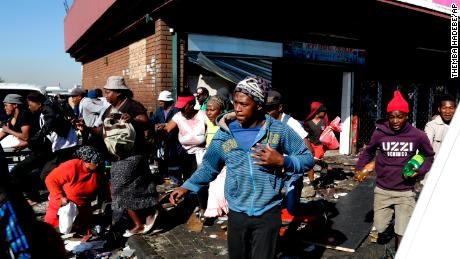
We’re improving intelligence to prevent attacks — South African Envoy
South Africa is improving its intelligence gathering to reduce the spate of xenophobic attacks and the looting of shops belonging to foreigners.
The South African Deputy High Commissioner in Ghana, Mr Thapelo Madumane, said the move was part of pre-emptive measures being adopted by the South African government to predict and stop the wave of attacks in the future.
Advertisement
He said at least 280 people had so far been arrested for violence and looting in Johannesburg, which he blamed on criminal gangs and vigilantism.
“Those who have been arrested will face the full might of the law. Our criminal justice system is ready to deal with perpetrators of violence, looting and lawlessness.
“We will continue to do everything in our power to ensure the safety of all who reside within our borders, citizens and foreign nationals, irrespective of their status,” he said at a press conference in Accra to react to media reports attributed to the South African High Commissioner, Ms Lulu Xingwana, that African countries should create employment for their citizens to prevent them from travelling to South Africa.
The press conference was also to update the public on happenings in South Africa.
No Ghanaian shot
Mr Madumane denied reports that a Ghanaian had been shot in South Africa, insisting that the Ghana High Commission in South Africa was in a position to verify the claim.
On the comments by Ms Xingwana that African governments should create jobs for their citizens, he said she was misunderstood.
He said the High Commissioner, who was one-time a Minister of Agriculture, had always spoken about the need to create jobs as part of measures to prevent young people from travelling abroad when they could find opportunities in their own countries.
Re-echoing the condemnation of the chaos on the streets of Johannesburg by the South African President, Mr Cyril Ramaphosa, the Deputy High Commissioner said: “We unequivocally condemn the attacks and promise all foreign nationals that we are committed to restoring law and order.
“There are those who believe that because of the high levels of unemployment and poverty, the competition for scarce resources for employment and social services could be the root causes. But we unequivocally condemn such attacks and reiterate the fact that the police have been deployed to ensure that the situation is normalised.”
South Africa’s National Statistics Office pegged the country’s unemployment figures at 29 per cent — the highest since the country’s quarterly labour force survey was introduced 11 years earlier.
“The concept of an African being a foreigner on the African continent is itself a foreign concept. We are acutely aware of the role that the continent played in the emancipation of our land during Apartheid. We received immense support from the continent, for which we are eternally grateful,” he said.
Economic gap
Although South Africa broke the chains of apartheid in 1994, thereby opening its business environment to its citizens, irrespective of their racial backgrounds, the economic gap between Black and White populations continue to widen, with the country regarded as the most unequal society in the world.
That notwithstanding, it is a major destination for economic migrants from neighbouring Lesotho, Mozambique and Zimbabwe. Others come from farther places including South Asia, Ethiopia, Angola, Ghana and Nigeria.
The migrants establish prosperous small businesses in low-income communities which are often targets for angry South African youth who accuse the foreigners of taking their jobs.
The latest xenophobic attacks have resulted in the death of five persons, according to the South African police.
Causes
Delving into the possible causes of the violence, which goes beyond 2008, the Deputy High Commissioner said it was also not factual that only foreign-owned shops that were attacked, saying that even before 1994 when South Africans owned retail shops, whenever there was a civil disorder, the shops were looted.
Mr Madumane said after independence in 1994, the retail sector was opened up and South Africans had to compete with others with superior marketing skills, thereby changing the patterns of ownership of the shops, now dominated by foreigners.
“It is not necessarily targeted at foreigners. Recently, when shops were attacked, there was no choosing; South African shops were looted, Pep, Shoprite…,” he added.
Meanwhile, there are reprisal attacks in Nigeria in protest against the attacks on foreigners, including Nigerians, in South Africa.
The South African High Commission in Nigeria has been shut down.



